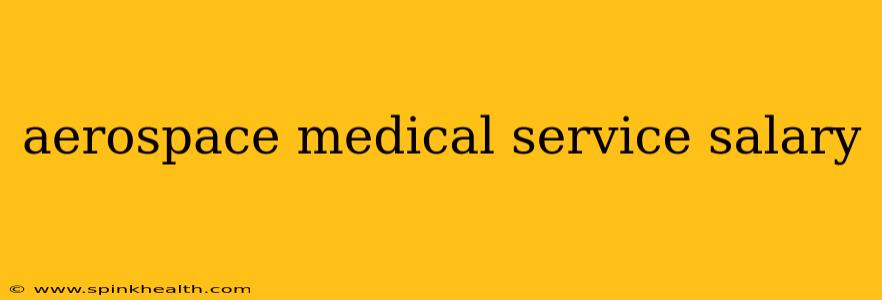The world of aerospace medicine is a fascinating blend of cutting-edge technology, rigorous science, and a deep commitment to human well-being. If you're considering a career in this specialized field, understanding the salary potential is a crucial step. This journey will delve into the factors that influence aerospace medical service salaries, exploring the diverse roles within the field and offering a glimpse into the earning potential. Prepare for takeoff!
What Factors Influence Aerospace Medical Service Salaries?
Several key factors determine the compensation an aerospace medical professional receives. These include:
-
Experience: As with most professions, years of experience play a significant role. Entry-level positions naturally command lower salaries than those held by seasoned experts with decades of experience under their belts. A seasoned flight surgeon, for example, will earn considerably more than a newly qualified physician just starting their career in aerospace medicine.
-
Specialization: The level of specialization within aerospace medicine significantly impacts salary. Physicians specializing in areas like aviation medicine, space medicine, or underwater medicine often command higher salaries than those with more general medical backgrounds working in aerospace settings. Sub-specialties within these areas also influence earnings.
-
Employer: The employing organization significantly influences salary. Government agencies like NASA or military branches typically offer competitive compensation packages, including benefits, that might differ from private companies in the aerospace sector. The size and financial stability of the employer also contribute to the overall compensation structure.
-
Location: Geographical location also plays a significant role. Metropolitan areas and regions with a high cost of living tend to offer higher salaries to compensate for the increased expenses. Rural locations or smaller towns may offer lower salaries.
-
Education and Certifications: The level of education and the specific certifications held by the individual directly affect salary expectations. Advanced degrees, board certifications in aviation medicine, and specialized training in areas like hyperbaric medicine will typically translate into higher earning potential.
What Do Aerospace Medical Professionals Do?
The scope of work for an aerospace medical professional is incredibly diverse. It's not just about treating injuries during space missions! Let's explore some roles:
-
Flight Surgeons: These professionals provide medical care to flight crews, ensuring their physical and mental fitness for flight. Their responsibilities include pre-flight medical examinations, managing in-flight medical emergencies, and conducting post-flight evaluations.
-
Space Medicine Physicians: Specializing in the unique challenges of space travel, these physicians address the physiological effects of space on the human body, including radiation exposure, bone density loss, and cardiovascular changes. Their expertise is critical for mission success and astronaut health.
-
Underwater Medical Technicians: Working in underwater environments, these professionals manage the medical needs of divers and submariners, specializing in decompression sickness and other diving-related ailments.
-
Aerospace Physiologists: These professionals study the effects of flight and space travel on the human body, conducting research to improve astronaut health and safety. They often work closely with flight surgeons and space medicine physicians.
What are the Typical Salary Ranges?
Providing exact salary figures is difficult due to the factors mentioned above. However, based on various sources and anecdotal evidence, a general overview can be presented:
-
Entry-Level Positions: Entry-level aerospace medical professionals can expect salaries ranging from $70,000 to $100,000 per year.
-
Experienced Professionals: Highly experienced professionals with advanced training and specialization can earn significantly more, potentially reaching salaries in excess of $200,000 annually. Some top earners can even surpass this figure.
How Can I Become an Aerospace Medical Professional?
A career in aerospace medicine requires significant dedication and education. Typically, it involves completing medical school, obtaining a medical license, and then pursuing specialized training in aviation or space medicine. Various certifications and advanced training programs further enhance career prospects.
What are the Job Outlook and Career Progression Opportunities?
The job outlook for aerospace medical professionals is generally positive, driven by the continued growth of the aerospace industry and the expanding frontiers of space exploration. Career progression opportunities often involve increasing responsibility, specialization, and leadership roles.
This exploration of aerospace medical service salaries provides a broad overview. For more precise information, it's essential to conduct thorough research based on specific roles, locations, and employers. The sky's the limit for those pursuing this exciting and rewarding career!

